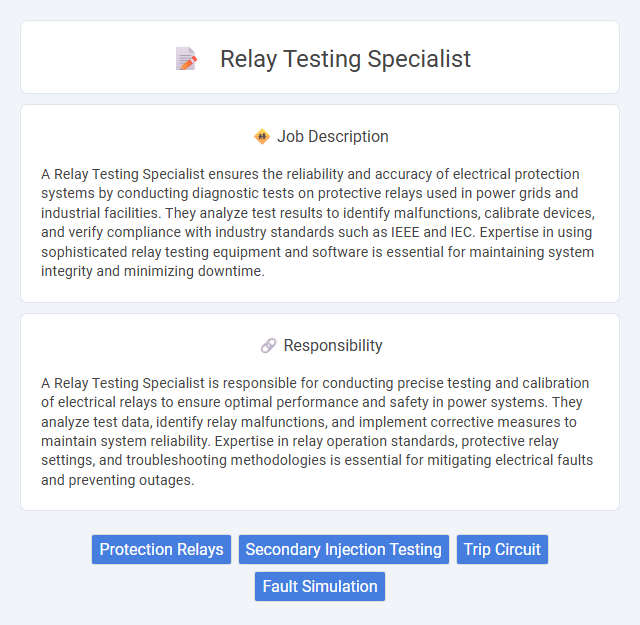
A Relay Testing Specialist ensures the reliability and accuracy of electrical protection systems by conducting diagnostic tests on protective relays used in power grids and industrial facilities. They analyze test results to identify malfunctions, calibrate devices, and verify compliance with industry standards such as IEEE and IEC. Expertise in using sophisticated relay testing equipment and software is essential for maintaining system integrity and minimizing downtime.
Individuals with strong analytical skills and attention to detail are likely to be well-suited for a Relay Testing Specialist role, as the job involves diagnosing and troubleshooting electrical relay systems. Those comfortable working in technical environments and handling complex equipment may find this career aligns with their strengths. Conversely, people who prefer less technical or routine tasks might find this position challenging and less engaging.
Qualification
A Relay Testing Specialist must possess a strong background in electrical engineering, typically holding a bachelor's degree in the field or a related technical discipline. Expertise in protection relays, testing equipment such as Omicron or Doble, and familiarity with IEEE and IEC relay protection standards are essential qualifications. Proven experience in performing relay testing, commissioning, troubleshooting, and interpreting test results ensures the ability to maintain power system reliability and safety.
Responsibility
A Relay Testing Specialist is responsible for conducting precise testing and calibration of electrical relays to ensure optimal performance and safety in power systems. They analyze test data, identify relay malfunctions, and implement corrective measures to maintain system reliability. Expertise in relay operation standards, protective relay settings, and troubleshooting methodologies is essential for mitigating electrical faults and preventing outages.
Benefit
Relay testing specialists likely experience benefits such as enhanced technical skills and increased job security due to the critical nature of their work in power system reliability. Their expertise probably leads to competitive salaries and opportunities for career advancement in the energy and utilities sector. The role may also provide job satisfaction through contributing to the safe and efficient operation of electrical networks.
Challenge
Relay testing specialists likely face the challenge of accurately diagnosing and troubleshooting complex electrical relay systems under tight deadlines. The probability of encountering unpredictable faults requires strong analytical skills and meticulous attention to detail. Maintaining reliability and safety in power systems often demands quick adaptation to evolving technologies and standards.
Career Advancement
A Relay Testing Specialist plays a critical role in verifying the performance and reliability of electrical relay systems within power grids, ensuring operational safety and efficiency. Mastery in cutting-edge testing techniques, industry standards like IEC 61850, and proficiency with advanced diagnostic tools can lead to rapid career progression toward senior engineering, project management, or technical consulting roles. Continuous professional development, certifications from bodies such as NETA or IEEE, and hands-on experience with next-generation smart grid technologies are key drivers for upward mobility in this specialized field.
Key Terms
Protection Relays
A Relay Testing Specialist ensures the accurate operation and reliability of Protection Relays within electrical power systems, performing precise calibration, functional testing, and fault simulation to detect potential failures. Expertise in industry standards such as IEC 61850 and IEEE C37.90 is critical for interpreting relay settings and ensuring system coordination and protection integrity. This role requires advanced knowledge of digital and electromechanical relays, as well as proficiency with testing tools like Omicron and Doble for diagnostic assessments.
Secondary Injection Testing
A Relay Testing Specialist skilled in Secondary Injection Testing ensures the precise calibration and functionality of protective relays by simulating fault conditions with controlled current injection. This critical process verifies relay performance, sensitivity, and trip settings, enhancing power system reliability and safety. Expertise in using advanced test equipment such as OMICRON and Doble devices is essential for accurate secondary injection testing and fault diagnosis.
Trip Circuit
A Relay Testing Specialist ensures the accurate functioning of protective relays, with a key focus on trip circuit verification to prevent false trips and system failures. Expertise in diagnosing trip circuit open or short conditions helps maintain system reliability and compliance with industry standards. Advanced knowledge of relay test equipment and real-time fault analysis optimizes power system protection and minimizes downtime.
Fault Simulation
Relay testing specialists conduct precise fault simulations to evaluate and verify the reliability of protective relays in electrical power systems. They employ advanced simulation tools and fault scenarios to replicate real-world electrical disturbances, ensuring relays respond accurately to faults such as short circuits, overloads, and line-to-ground faults. This process is critical for maintaining grid stability and preventing equipment damage by validating relay settings and response times under various fault conditions.
 kuljobs.com
kuljobs.com